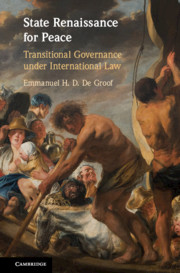Book contents
- Reviews
- State Renaissance for Peace
- State Renaissance for Peace
- Copyright page
- Dedication
- Contents
- Tables
- Foreword
- Preface
- Acknowledgements
- Additional material
- Abbreviations
- Introduction Transitional Governance Today
- Part I The Unchartered Territory of Transitional Governance
- Part II Foundation and Actors of Transitional Governance * Sources of Ius in Interregno
- 3 The Foundation of Transitional Governance
- 4 The Actors of the Interregnum
- 5 The Sources of Ius in Interregno
- Part III Self-Determination through Transitional Governance
- Part IV Moderating External Influence on Transitional Governance
- Index
4 - The Actors of the Interregnum
from Part II - Foundation and Actors of Transitional Governance * Sources of Ius in Interregno
Published online by Cambridge University Press: 10 September 2020
- Reviews
- State Renaissance for Peace
- State Renaissance for Peace
- Copyright page
- Dedication
- Contents
- Tables
- Foreword
- Preface
- Acknowledgements
- Additional material
- Abbreviations
- Introduction Transitional Governance Today
- Part I The Unchartered Territory of Transitional Governance
- Part II Foundation and Actors of Transitional Governance * Sources of Ius in Interregno
- 3 The Foundation of Transitional Governance
- 4 The Actors of the Interregnum
- 5 The Sources of Ius in Interregno
- Part III Self-Determination through Transitional Governance
- Part IV Moderating External Influence on Transitional Governance
- Index
Summary
TA, whether consensual or oppositional, have a civilian nature or portfolio and are to be contrasted with armed opposition groups and NLM. Their finality is not armed struggle but the exercise of political power during the interregnum in view of a state renaissance in a specific historic context: the rise of the peace-through-transition paradigm since the end of the Cold War. The role of contemporary TG has been aggrandized in this sense. TG is by definition pursued on a provisional basis, and can be divided into four stages, with the two middle stages (foundation and interregnum) being most relevant. During the interregnum, the redefinition of the state order is an exercise of public power, and eminently so. TA, even without being allotted governmental status (as of yet), may enjoy legal personality to the extent that they effectively exercise such power, are seen as addressees of international obligations, or (subsequently) come to represent the state.
Keywords
- Type
- Chapter
- Information
- State Renaissance for PeaceTransitional Governance under International Law, pp. 114 - 149Publisher: Cambridge University PressPrint publication year: 2020

